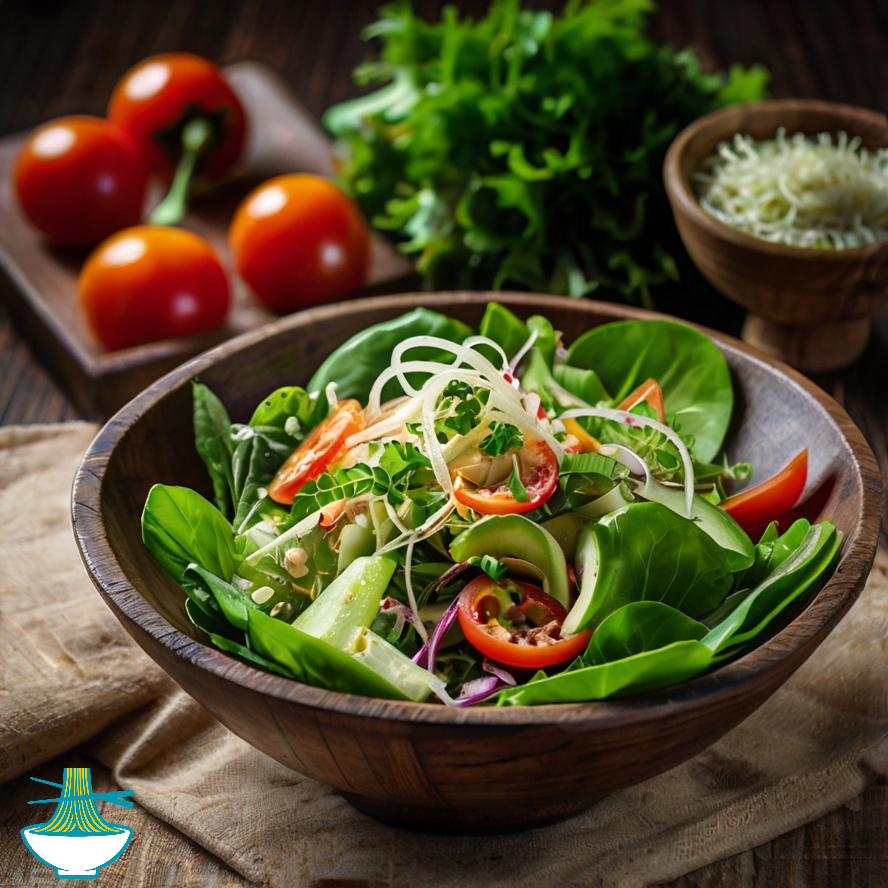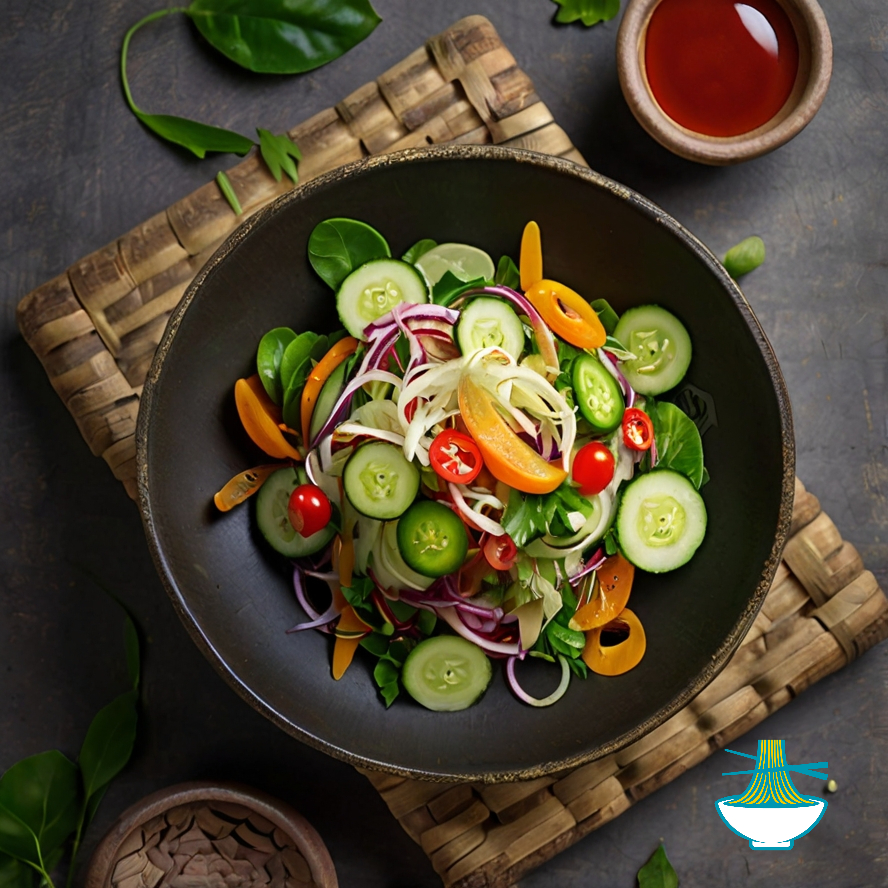Indonesia's Karedok is a delightful dish hailing from West Java, featuring a vibrant mix of raw vegetables like cucumber, bean sprouts, and cabbage, bathed in a luscious peanut sauce. This traditional salad is not only a feast for the eyes but also a burst of fresh flavors and textures, making it a refreshing and healthy choice for any meal.
Here's a traditional recipe for Indonesia's Karedok:
Ingredients:
- 1 cup bean sprouts
- 1 cucumber, thinly sliced
- 1 cup cabbage, thinly sliced
- 1 cup long beans, cut into 2-inch pieces
- 1 small bunch of Thai basil leaves
- 1 small bunch of mint leaves
- 1 small bunch of kemangi (Asian basil) leaves
- 1 small bunch of daun melinjo (Gnetum gnemon) leaves, sliced thinly
- 1 cup peanuts, roasted and coarsely ground
- 3-4 red chilies, chopped
- 3 cloves garlic
- 2 tablespoons palm sugar
- 1 teaspoon tamarind paste, dissolved in 2 tablespoons water
- Salt, to taste
For the peanut sauce:
1- Blend the roasted peanuts, red chilies, garlic, palm sugar, tamarind paste mixture, and salt in a food processor until smooth. Add water if needed to reach a sauce-like consistency.
For the salad:
1- Blanch the bean sprouts, long beans, and cabbage in boiling water for about 1 minute. Drain and set aside to cool.
2- In a large bowl, mix the blanched vegetables with the cucumber slices, Thai basil leaves, mint leaves, kemangi leaves, and daun melinjo leaves.
3- Pour the peanut sauce over the vegetables and toss gently to coat.
4- Serve the Karedok chilled or at room temperature.
Enjoy this refreshing and nutritious Indonesian salad!
Nutritional Values :
Here's an approximate nutritional breakdown for the ingredients in the Karedok recipe:
Bean Sprouts (1 cup):
- Calories: 31 kcal
- Fat: 0.2g
- Carbohydrates: 6g
- Protein: 3g
Benefits: Bean sprouts are low in calories and rich in vitamins C and K, which support immune function and bone health. They are also high in fiber, promoting digestive health.
Cucumber (1 small, thinly sliced):
- Calories: 16 kcal
- Fat: 0.1g
- Carbohydrates: 4g
- Protein: 0.7g
Benefits: Cucumbers are hydrating and contain antioxidants that support skin health and help manage blood sugar levels.
Cabbage (1 cup, thinly sliced):
- Calories: 22 kcal
- Fat: 0.1g
- Carbohydrates: 5g
- Protein: 1g
Benefits: Cabbage is rich in vitamin C, fiber, and antioxidants, supporting immune function, digestive health, and reducing inflammation.
Long Beans (1 cup, cut into 2-inch pieces):
- Calories: 47 kcal
- Fat: 0.3g
- Carbohydrates: 9g
- Protein: 3g
Benefits: Long beans are a good source of vitamin A, folate, and dietary fiber, which support eye health, prenatal health, and digestion.
Thai Basil Leaves (1 small bunch):
- Calories: 2 kcal per 10 leaves
- Fat: 0g
- Carbohydrates: 0.4g
- Protein: 0.1g
Benefits: Thai basil is rich in antioxidants and essential oils, which have anti-inflammatory and antimicrobial properties, aiding in digestion and overall health.
Mint Leaves (1 small bunch):
- Calories: 2 kcal per 10 leaves
- Fat: 0g
- Carbohydrates: 0.4g
- Protein: 0.1g
Benefits: Mint leaves are soothing to the digestive system and can help relieve symptoms of indigestion and irritable bowel syndrome (IBS).
Kemangi (Asian Basil) Leaves (1 small bunch):
- Calories:2 kcal per 10 leaves
- Fat: 0g
- Carbohydrates: 0.4g
- Protein: 0.1g
Benefits: Kemangi leaves are similar to Thai basil, offering antimicrobial and anti-inflammatory benefits, and supporting digestive health.
Daun Melinjo (Gnetum gnemon) Leaves (1 small bunch, sliced thinly)
- Calories:5 kcal per small handful
- Fat:0g
- Carbohydrates:1g
- Protein:0.5g
Benefits: Daun Melinjo leaves are rich in antioxidants and have anti-inflammatory properties. They are also a good source of vitamins A and C.
Peanuts (1 cup, roasted and coarsely ground):
- Calories: 828 kcal
- Fat: 72g
- Carbohydrates: 24g
- Protein:38g
Benefits: Peanuts are a rich source of protein, healthy fats, and various vitamins and minerals. They support heart health and provide sustained energy.
Red Chilies (3-4, chopped):
- Calories:18 kcal per chili
- Fat: 0.2g
- Carbohydrates: 4g
- Protein:0.8g
Benefits: Chilies contain capsaicin, which boosts metabolism, reduces inflammation, and provides antioxidants.
Garlic (3 cloves):
- Calories:13 kcal
- Fat: 0g
- Carbohydrates: 3g
- Protein: 0.6g
Benefits: Garlic is known for its immune-boosting properties, as well as its ability to lower cholesterol and blood pressure.
Palm Sugar (2 tablespoons):
- Calories: 120 kcal
- Fat: 0g
- Carbohydrates: 30g
- Protein: 0g
Benefits: Palm sugar is a natural sweetener with a low glycemic index, providing energy without causing blood sugar spikes.
Tamarind Paste (1 teaspoon, dissolved in 2 tablespoons water):
- Calories:15 kcal
- Fat: 0g
- Carbohydrates: 4g
- Protein: 0.2g
Benefits: Tamarind is rich in antioxidants and aids in digestion, helps manage blood pressure, and provides a tangy flavor to dishes.
Salt (to taste):
- Calories: 0 kcal
- Fat: 0g
- Carbohydrates: 0g
- Protein: 0g
Benefits: Salt enhances flavor but should be used in moderation to avoid health issues like high blood pressure.
Keep in mind that these values are approximate and can vary based on factors such as the specific variety of ingredients and preparation methods.


Comments